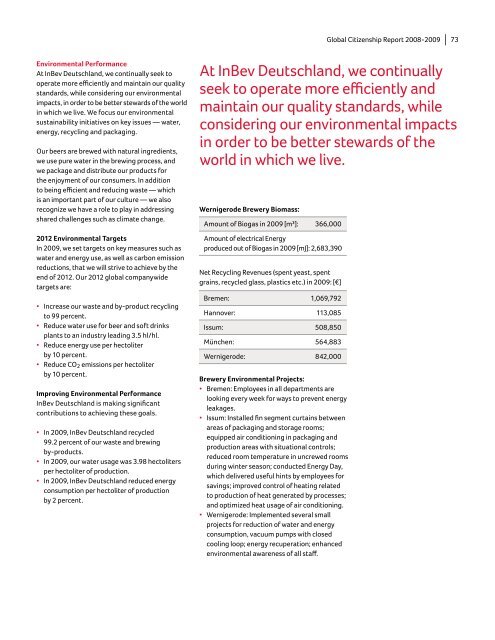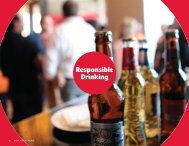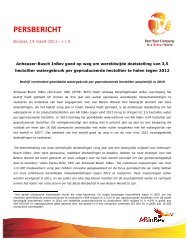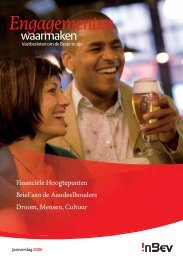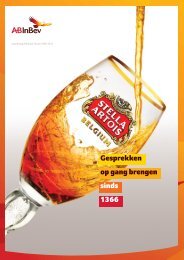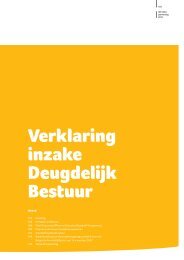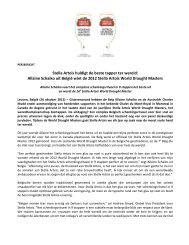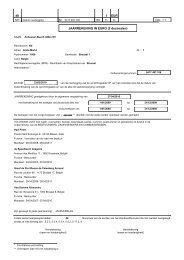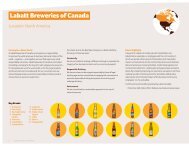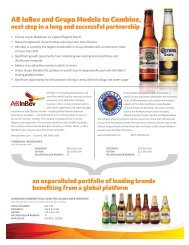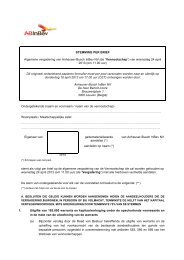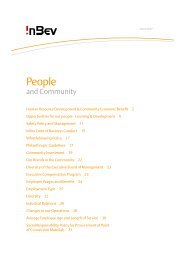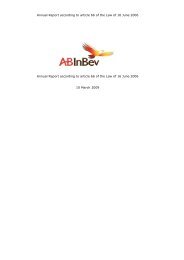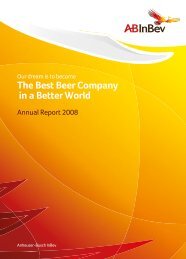Beer & A Better World - Anheuser-Busch InBev
Beer & A Better World - Anheuser-Busch InBev
Beer & A Better World - Anheuser-Busch InBev
Create successful ePaper yourself
Turn your PDF publications into a flip-book with our unique Google optimized e-Paper software.
environmental Performance<br />
At <strong>InBev</strong> Deutschland, we continually seek to<br />
operate more efficiently and maintain our quality<br />
standards, while considering our environmental<br />
impacts, in order to be better stewards of the world<br />
in which we live. We focus our environmental<br />
sustainability initiatives on key issues — water,<br />
energy, recycling and packaging.<br />
Our beers are brewed with natural ingredients,<br />
we use pure water in the brewing process, and<br />
we package and distribute our products for<br />
the enjoyment of our consumers. In addition<br />
to being efficient and reducing waste — which<br />
is an important part of our culture — we also<br />
recognize we have a role to play in addressing<br />
shared challenges such as climate change.<br />
2012 environmental Targets<br />
In 2009, we set targets on key measures such as<br />
water and energy use, as well as carbon emission<br />
reductions, that we will strive to achieve by the<br />
end of 2012. Our 2012 global companywide<br />
targets are:<br />
• Increase our waste and by-product recycling<br />
to 99 percent.<br />
• Reduce water use for beer and soft drinks<br />
plants to an industry leading 3.5 hl/hl.<br />
• Reduce energy use per hectoliter<br />
by 10 percent.<br />
• Reduce CO2<br />
emissions per hectoliter<br />
by 10 percent.<br />
improving environmental Performance<br />
<strong>InBev</strong> Deutschland is making significant<br />
contributions to achieving these goals.<br />
• In 2009, <strong>InBev</strong> Deutschland recycled<br />
99.2 percent of our waste and brewing<br />
by-products.<br />
• In 2009, our water usage was 3.98 hectoliters<br />
per hectoliter of production.<br />
• In 2009, <strong>InBev</strong> Deutschland reduced energy<br />
consumption per hectoliter of production<br />
by 2 percent.<br />
Wernigerode brewery biomass:<br />
Net Recycling Revenues (spent yeast, spent<br />
grains, recycled glass, plastics etc.) in 2009: [€]<br />
brewery environmental Projects:<br />
• Bremen: Employees in all departments are<br />
looking every week for ways to prevent energy<br />
leakages.<br />
• Issum: Installed fin segment curtains between<br />
areas of packaging and storage rooms;<br />
equipped air conditioning in packaging and<br />
production areas with situational controls;<br />
reduced room temperature in uncrewed rooms<br />
during winter season; conducted Energy Day,<br />
which delivered useful hints by employees for<br />
savings; improved control of heating related<br />
to production of heat generated by processes;<br />
and optimized heat usage of air conditioning.<br />
• Wernigerode: Implemented several small<br />
projects for reduction of water and energy<br />
consumption, vacuum pumps with closed<br />
cooling loop; energy recuperation; enhanced<br />
environmental awareness of all staff.<br />
Global Citizenship Report 2008-2009 | 73<br />
At <strong>InBev</strong> Deutschland, we continually<br />
seek to operate more efficiently and<br />
maintain our quality standards, while<br />
considering our environmental impacts<br />
in order to be better stewards of the<br />
world in which we live.<br />
Amount of Biogas in 2009 [m³]: 366,000<br />
Amount of electrical Energy<br />
produced out of Biogas in 2009 [mJ]: 2,683,390<br />
Bremen: 1,069,792<br />
Hannover: 113,085<br />
Issum: 508,850<br />
München: 564,883<br />
Wernigerode: 842,000


